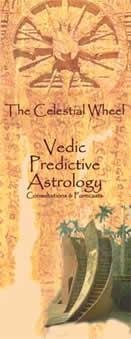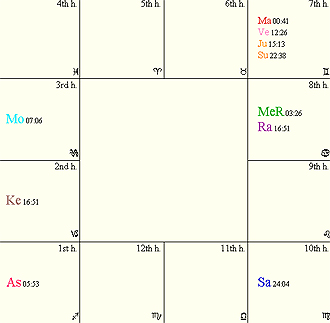U.S. Psychology Introduction Vedic Astrology's predictive model, as compared with Western Astrology's psychological one, suggests that Vedic doesn't measure the mindset of a person or country. This is untrue, for Vedic Astrology readily unveils the chart's desires, courage, fears, anger, jealousy, objectivity, (or lack thereof), mental acuity, selfishness (and the opposite, selflessness), greed, compassion, altruism, benevolence.. all the factors that make up human behavior, which is what psychology is. For example, a prediction for overcoming a business failure naturally rests upon the lifelong and emerging karmas of talent, wealth and power. But without including courage, initiative, social skills, etc., a reliable prediction cannot be made. As the greedy and corrupt Second Gilded Age ends November 30, 2008 nearly in tandem with the November 4 general election (President and Congress), the country is at a crossroads. Will the extreme neoconservative agenda continue, will an equally extreme liberal prevail, or will the people choose leaders dedicated to resolving problems to serve the broader needs of the entire society? In other words, will the U.S. continue to be prey to its psychological frailties, or will voters select leaders striving for objective analysis and fair decision-making? This crossroads concept is fundamental. As explained in the December 1, 2007 In-depth Celestial Wheel, Through The Second Gilded Age, following this second 10 year greedy Moon planetary cycle (Dasa), the U.S. chart's second * 10 year Mars cycle indicates an economic depression. This occurred in the nineteenth century -- during the first Moon and Mars cycles. The first ten year Moon cycle in the 1880s marked the peak of the First Gilded Age. The following first seven year Mars cycle saw the Financial Panic of 1893 begin the spiraling down that culminated in the worst depression to date. See, The Depression of 1893 for a thoughtful analysis, which includes looking beyond that depression,
(*Planetary cycles are the heart of Vedic Astrology. Each of the 9 Vedic planets has a cycle lasting from 6 to 20 years. Adding these together gives a total of 120 years. Obviously, for personal charts, no one completes the cycles of all 9 planets. However, for a nation chart that was born more than 120 years, ago, as the U.S. was, after the first 120 years cycles set is completed, the nation begins its second cycles-set. Chart analysis thereby includes looking at what occurred during each of the first 9 planetary cycles to learn how these planets will behave when they are active again in the second set. For complete information on these cycles, see the December 2, 2004 two part series, The U.S. Through Its Planetary cycles, Part 1 and Part 2. There more information on the upcoming Mars cycle in the December 1, 2007 Through The Second Gilded Age predicting an economic depression.) (**Liberalism here is not social liberalism but rather economic liberalism. This was termed laissez-faire capitalism, denoting no government interference on commerce, like today's neoconservative philosophy.)
The U.S. Chart's Optimism, Wisdom, Wealth & Paranoia
Wealth results from Jupiter being wealth, ruling the good first house and the fourth house of property and other fixed assets. This rich Jupiter conjunct a wealthy Sun (ruling the ninth house of wealth) and wealthy Mars (ruling the fifth house of investments) signifies tremendous wealth of many kinds. (Note: This Mars brings economic loss during its planetary cycle, but during the cycles of the other planets, its wealth signification flourishes.) Combining this optimism, wisdom and wealth, Turning lemons into lemonade is the essence of America -- as long as we can beat back the paranoia -- next discussed. Paranoia comes from eclipse point Rahu conjunct Mercury in the terrible eighth house of secrets and catastrophes. That mental Mercury rules the seventh house of relationships and the social nature and the tenth house of the public, makes this a truly societal-wide issue. Further, as Rahu is the head-of-the dragon eclipse point of a foreign nature, there is a deep distrust, even fear, of other cultures. (Still, there's also a potent curiosity about foreign things and people.) Powerful Rahu's influence on mutable Mercury makes Americans anxious and feel under attack, especially when under pressure. As this does occur from time to time validates the belief, even as it is exaggerated. Finally, the eighth is the house of mysticism, explaining why America always has religious cults of many kinds, and these often prey on American's fears and distrust of other peoples' and beliefs. As the eighth house is also sexual power and forbidden activities, these cults typically bring those influences in -- and the most conservative political and religious leaders are thereby often caught with their pants down. Note that cult here is intended to describe all the fringe groups: the evangelical extremists awaiting Armageddon, other doomsday cults, the fascists and other white supremacists, the survivalists, the conspiracy theorists, the fundamentalist Mormons, the Masons, the paranoid NRA, the neoconservatives, the false Indian prophets, and even the hippies, who for a time were protected by the lawless Hells Angels. What brought these opposing hippies and motorcyle gang together was their shared fear and distrust of authority. (The Appalachian Christian snake cult is the best. It dovetails so well with Rahu.) FDR said it best in his first inaugural address in 1932, when the nation was mired in the Great Depression, The Only Thing We Have to Fear Is Fear Itself. To give a broad estimate of the how widespread America's paranoia is, consider that Mercury and Rahu are two out of the nine Vedic planets, and they are placed in the terrible (because it's terrifying) eighth house. There are no other evil house placement in the U.S. chart. 2/9 computes to 22%, or a little over one fifth of the population, which not coincidentally is the neoconservative base which still believes in Cheney, Bush and the faked global war on terror. This mix of optimism, wisdom, wealth and paranoia is spicy, and as the planetary karmas ebb and flow, these qualities mix into distinctly different recipes. America's is truly the most abundant and crazily diverse, yet firmly bonded, psychology. Yet, the above discussion is about fated influences, and we do have free will. In fact, some of these fated influences support free will expression -- as in the example of lawful Jupiter relating to the Constitution. Understanding the mix of fate and free will is the most challenging task, and perhaps it is best addressed by this somewhat intriguing but typically enigmatic Eastern saying, Fate and free will are two blades of a scissor, and we still do not know which blade operates in cutting the paper.
|


